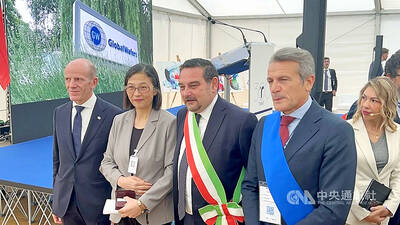Delta Electronics Inc (台達電) yesterday announced plans to acquire three building automation companies in a bid to enhance its global presence in this fast expanding market.
“The building automation industry is growing rapidly and has high potential,” Delta chairman Yancey Hai (海英俊) told an investors’ conference in Taipei. “It is expected to play an important role in Delta’s future growth.”
Building automation refers to a wide range of smart solutions used in various kinds of buildings, such as offices, hotels, hospitals and residential buildings.
The market for building automation is expected to reach US$70.4 billion this year and jump nearly 30 percent to US$91.3 billion by 2020, Delta chief executive officer Cheng Ping (鄭平) said, citing international studies.
Delta reached an agreement to acquire with Austria-based Loytec Group to acquire 85 percent shareholdings in the group’s Loy Tec Electronics GmbH and Innocontrol Electronics GmbH for 72 million euros (US$82 million), the Taiwanese company said on its Web site.
It expects to acquire the remaining 15 percent stakes in both companies in the future, it added.
Delta Electronics also signed an agreement to acquire Surrey, Canada-based Delta Controls Inc for C$220 million (US$175.7 million), it said. The transaction is expected to be completed before the end of this month.
BOOKING REVENUES
Delta Electronics expects to begin booking revenues from Loytec Group this month and from Delta Control next month.
Although annual revenue contribution from the new investments is estimated to reach only about US$60 million, or 1 percent of Delta’s total annual revenue, the companies are financially healthy and profitable, Hai said.
Loytec Group and Delta Controls have operating margins of between 60 percent and 80 percent, and gross margins of about 20 percent, Delta Electronics said.
Delta Controls offers advanced technologies in controlling heat, ventilation and air conditioning (HVAC), while Loytec Group’s strength lies in its capability to integrate building management and control systems, Cheng said.
Their different expertises, client bases and distribution channels should help Delta Electronics expand its presence in the building automation market, he said.
These investments are just the beginning as Delta Electronics continues to seek merger and acquisition opportunities to secure its position in the field, he added.
FIRST-QUARTER RESULTS
The company yesterday also reported its first-quarter results, with net income reaching NT$3.88 billion, edging up 0.51 percent from a year earlier, but dropping 24.66 percent sequentially.
Earnings per share were NT$1.5 last quarter, compared with NT$1.59 a year ago and NT$1.99 in the prior quarter. Delta Electronics attributed the mild increase in net profit to increasing demand for power management, while the quarterly drop was due to seasonal factors.
The company expects revenue for this quarter to grow by a double-digit percentage from last quarter’s NT$47.6 billion, investor relations officer Rodney Liu (劉致遠) said.
Hai said Delta Electronics’ operations are likely to hit the peak next quarter, citing the company’s historical pattern.

RECYCLE: Taiwan would aid manufacturers in refining rare earths from discarded appliances, which would fit the nation’s circular economy goals, minister Kung said Taiwan would work with the US and Japan on a proposed cooperation initiative in response to Beijing’s newly announced rare earth export curbs, Minister of Economic Affairs Kung Ming-hsin (龔明鑫) said yesterday. China last week announced new restrictions requiring companies to obtain export licenses if their products contain more than 0.1 percent of Chinese-origin rare earths by value. US Secretary of the Treasury Scott Bessent on Wednesday responded by saying that Beijing was “unreliable” in its rare earths exports, adding that the US would “neither be commanded, nor controlled” by China, several media outlets reported. Japanese Minister of Finance Katsunobu Kato yesterday also

‘DRAMATIC AND POSITIVE’: AI growth would be better than it previously forecast and would stay robust even if the Chinese market became inaccessible for customers, it said Taiwan Semiconductor Manufacturing Co (TSMC, 台積電) yesterday raised its full-year revenue growth outlook after posting record profit for last quarter, despite growing market concern about an artificial intelligence (AI) bubble. The company said it expects revenue to expand about 35 percent year-on-year, driven mainly by faster-than-expected demand for leading-edge chips for AI applications. The world’s biggest contract chipmaker in July projected that revenue this year would expand about 30 percent in US dollar terms. The company also slightly hiked its capital expenditure for this year to US$40 billion to US$42 billion, compared with US$38 billion to US$42 billion it set previously. “AI demand actually

Jensen Huang (黃仁勳), founder and CEO of US-based artificial intelligence chip designer Nvidia Corp and Taiwan Semiconductor Manufacturing Co (TSMC, 台積電) on Friday celebrated the first Nvidia Blackwell wafer produced on US soil. Huang visited TSMC’s advanced wafer fab in the US state of Arizona and joined the Taiwanese chipmaker’s executives to witness the efforts to “build the infrastructure that powers the world’s AI factories, right here in America,” Nvidia said in a statement. At the event, Huang joined Y.L. Wang (王英郎), vice president of operations at TSMC, in signing their names on the Blackwell wafer to

Taiwan-based GlobalWafers Co., the world’s third largest silicon wafer supplier, on Wednesday opened a 12-inch silicon wafer plant in Novara, northern Italy - the country’s most advanced silicon wafer facility to date. The new plant, coded “Fab300,” was launched by GlobalWafers’ Italian subsidiary MEMC Electronics Materials S.p.A at a ceremony attended by Taiwan’s representative to Italy Vincent Tsai (蔡允中), MEMC President Marco Sciamanna and Novara Mayor Alessandro Canelli. GlobalWafers Chairwoman Doris Hsu (徐秀蘭) said the investment marked a milestone in the company’s expansion in Europe, adding that the Novara plant will be powered entirely by renewable energy - a reflection of its